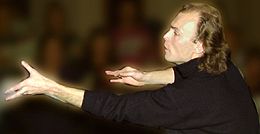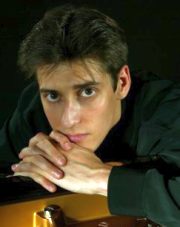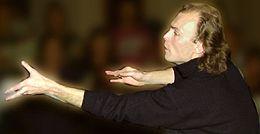
Ashkenazy opened with the premiere of Steven Gerber’s Music in Dark Times, a piece he himself had commissioned. Then came pianist Yevgeny Sudbin, playing a fine performance of Beethoven’s Piano Concerto No. 4 in G Major, Op. 58. Following intermission, there was a knockout performance of Sir William Walton’s epic Technicolor cantata Belshazzar’s Feast, with bass-baritone John Relyea as soloist and the Symphony Chorus, marvelously prepared by Chorus Director Ragnar Bohlin.
The Walton was tremendously thrilling, but then, in a decent performance, it always is. Yet on Thursday it was not merely decent, it was superlative. It’s basically a choral piece. Many sections, including the imposing opening, “Thus spake Isaiah,” are sung a cappella. The chorus thus does the lion’s share of the work throughout the cantata, with the orchestra providing no more than color support, along with important though relatively scarce solos for the bass soloist. There is, for instance, no large overture or interlude for the orchestra alone.
The San Francisco Symphony Chorus has long been recognized for its excellence, with an Emmy and four Grammys to prove it. Yet even by their normally high standards, their Belshazzar’s Feast was astounding. I’ve never heard them — nor any other chorus, for that matter — produce such powerful, clean-dictioned elocution and such a perfect blend. I could actually hear all the text, even during the louder orchestral accompaniments.

No doubt, director Bohlin had much to do with this. In return, he received multiple, wildly cheering ovations, and richly hath he deserved them. I say unto you, “a winner!” After this event, management should give him a raise.
Bass-baritone Relyea was a product of the S.F. Opera’s Merola Program and Adler Fellowships. Since then he’s gone on to a major international opera career, appearing at the Metropolitan Opera, Covent Garden, Paris, Munich, and Vienna, and also making guest appearances with major orchestras — you name it, he’s done it.
He possesses a big, dark-tinted voice of the sort associated with the great Russian bassos. (What a Boris Godunov he’d make. ...) When he cut loose during his big solos, such as “Praise Ye the God of Gold,” I nearly came out of my seat. He was that commanding.
Calm Amid the Storm
Young pianist Sudbin, born in 1980, displayed a tremendously complete keyboard technique, highlighted by a command of all his instrument’s varied timbres. He could glisten, or merely tickle the keys, and then effortlessly slip into heroic sounds. He could roam among the piano colors without ever showing the slightest seams. For all his virtuosity, his calm profundity while playing the choralelike slow movement of Beethoven’s super masterpiece (admittedly, my favorite among Beethoven’s five piano concertos) reminded me of Artur Schnabel at his best.
Photo by Clive Barda
Sudbin already has a recording contract with BIS and has won major prizes for his albums. He’s already much in demand for recitals and concerto appearances. All that said, I noted one problem: Rhythmically, during fast scales and passagework, he tended to dart ahead just a little. But, considering his age, that might be attributed to mere nervousness.
Listening to the first composer on the program, Gerber, I briefly thought of the Walton piece. After all, the handwriting on the wall that appeared to Belshazzar translates as “Thou art weighed in the balance and found wanting.” According to the prophet Isaiah, he was assassinated that very night. I am reasonably certain that composer Gerber was not slain, though in the balance, I found him sorely wanting.
About 20 minutes in length, his piece, Music in Dark Times, consisted of six sections: “Fanfare I (Fanfare for the Voice of A-M-E-R-I-C-A)”; “Pavane-Homage”; “Dance of Death (Tarantella)”; “Dead March”; “Elegy for Strings (Theme and Two Variations),” and “Coda: Fanfare II.” Despite all this pomp, the music sounded unimaginative in the extreme. The effect suggested a scramble of minor excerpts from those 1950s Hollywood epics of the “Re-LEASE the lions!” variety.
Born in Washington, D.C., and currently a resident of New York City, Gerber has had his share of successes and praise. Some of his music has been recorded, even by an English company like Chandos. So listeners might have expected something of importance from his pen.
Yet I found nothing of merit in his work, neither melodic invention nor comely instrumentation. The orchestration, both by sections and in totality, was never in balance. Things as basic as laying out voicing for the brass choir escaped him — a grave contrast with, say, Walton.
Indeed, the musicians of our orchestra seemed listless and semidiscouraged by the ineptitude of the piece. I’ve never encountered this before at Davies Symphony Hall. Lord knows, they can play like gangbusters, as they proceeded to do for both the Beethoven and Walton compositions, especially in that sterling support for the Beethoven Concerto. (In fairness, it should be noted that the audience applauded the Gerber work, some from a standing position.)
Overall, however, the superstar of the concert was the magnificent, utterly exceptional choral singing of Walton’s Cantata, followed closely by the local debut of what sounds like a major new virtuoso pianist.

